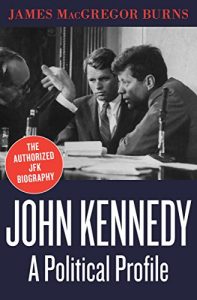The authorized biography of John F. Kennedy offers a fresh and candid look at what shaped the man America came to love and admire, just as he was on the cusp of the presidency
Historian, political scientist, and Pulitzer Prize–winning author James MacGregor Burns wrote Roosevelt: The Lion and the Fox, the first volume of his highly acclaimed biography of FDR, in 1956. Two years later, Burns ran for a seat in Congress and became close friends with John F. Kennedy, who was also campaigning throughout the state for reelection to the Senate. After Burns lost his election, he decided to write a biography of JFK. Without any restrictions, Kennedy granted his friend complete access to files, family records, and personal correspondence. The two men spoke at great length in Washington, DC, and at the Kennedy family compound on Cape Cod, and afterwards, Kennedy asked his relatives, friends, and political colleagues to talk openly with Burns as well. The result is a frank, incisive, and compelling portrait of Kennedy from his youth to his service in World War II and his time in Congress.
While many political biographies—especially those of presidential candidates—intend to depict a certain persona, Burns would not allow anything other than his own perception to influence him. And so, John Kennedy concludes questioning whether JFK would make “a commitment not only of mind, but of heart” to the great challenges that lay ahead. (Burns would later admit that his subject did bring both bravery and wisdom to his presidency.) First published just as Kennedy was coming into the national spotlight, this biography gives a straightforward and exciting portrayal of one of the twentieth century’s most important figures.
Historian, political scientist, and Pulitzer Prize–winning author James MacGregor Burns wrote Roosevelt: The Lion and the Fox, the first volume of his highly acclaimed biography of FDR, in 1956. Two years later, Burns ran for a seat in Congress and became close friends with John F. Kennedy, who was also campaigning throughout the state for reelection to the Senate. After Burns lost his election, he decided to write a biography of JFK. Without any restrictions, Kennedy granted his friend complete access to files, family records, and personal correspondence. The two men spoke at great length in Washington, DC, and at the Kennedy family compound on Cape Cod, and afterwards, Kennedy asked his relatives, friends, and political colleagues to talk openly with Burns as well. The result is a frank, incisive, and compelling portrait of Kennedy from his youth to his service in World War II and his time in Congress.
While many political biographies—especially those of presidential candidates—intend to depict a certain persona, Burns would not allow anything other than his own perception to influence him. And so, John Kennedy concludes questioning whether JFK would make “a commitment not only of mind, but of heart” to the great challenges that lay ahead. (Burns would later admit that his subject did bring both bravery and wisdom to his presidency.) First published just as Kennedy was coming into the national spotlight, this biography gives a straightforward and exciting portrayal of one of the twentieth century’s most important figures.






